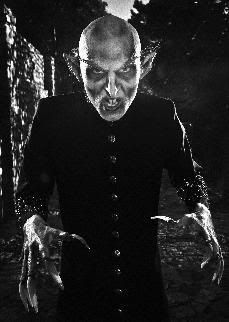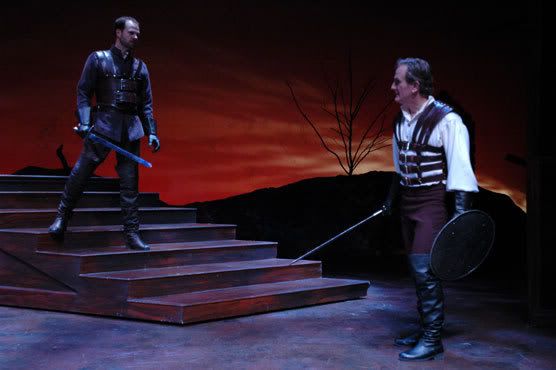theatre
11.01.2008

I love theatre. This fact was reaffirmed last night when we went to the midnight showing of Nosferatu at UVU. We got to the theatre, dressed in our fantastic costumes (I walked in to whispers of "that's Carmen Sandiego" and a lot of blatant stares. It was great), and sat down. I really wasn't sure what to expect, but I noticed that the stage was set up like a movie set (sort of), with lights and different scenes set all over the stage, and a large white projector screen above the stage. Which intrigued me. The play started, and I quickly caught on to the fact that we were going to be watching what the camera operators and techs (which were also present on stage) filmed right in front of us. They basically took the 1922 silent, black and white movie, and showed it on the screen, while substituting, oh, maybe 75% of it with scenes they shot in real-time on the stage. No words were said the entire play, except for by techs calling the cues when they paused for words to be shown on the screen (silent film) and to start, stop, and change scenes. It truly was phenomenal, and it was so interesting to see the correlation between stage and screen, and how different the two really are. I'd never seen anything quite like it before, but I certainly hope to again. Mixed-media productions definitely have a promising future in today's theatre world.
The other most life-changing performance I have ever seen was Macbeth, during the fall season of the Shakespearean Festival in Cedar City, a few years ago (2004, I believe). It wasn't the acting that blew me away, though it was extraordinary as well. It was the set design, and what they decided to do with it. The stage was set up as the front hall of a castle, or manor, or whatever, with (from left to right): the large front door with a stained glass window above it, a staircase opening into a doorway, a very large tapestry, and another doorway at ground level. The performers were amazing (of course, since it was the Shakespearean Festival), and when Macbeth decides to kill King Duncan, and goes up the stairs and through the doorway, they shine a red light behind the tapestry, so we're shown a jagged-bordered silhouette of a rickety stairway, with Macbeth creeping up it, holding a dagger erect. Wow. When Macbeth kills the King, a bell chimes, an owl hoots, and the stained glass window breaks. The play continues, and then when Banquo is killed, the bell chimes again, and the stage separates (flies apart, more like) essentially down the middle, about 6 or so feet. Later on, when Macduff's family is murdered, the stage separates another 10 feet, with another chime. Next, when Lady Macbeth is proclaimed dead, the bell chimes once again, and the set goes off stage completely, leaving only a set of stairs and the silhouette of a graveyard in the background. With that as the set, we finally see Macduff and Macbeth fight, and Macbeth fall. A fantastic play, and a fantastic way of presenting it. It was so creepy and wonderfully done.

And so, I love theatre. I love film as well, but for a few different reasons (cinematography being first and foremost). I've grown up around theatre, thanks to Tracy. When I was young, instead of playing cops and robbers, or cowboys and indians, or even fairy princesses, I was playing Romeo and Tybalt. That definitely says something about me. And I love that fact. So I hope to be involved in some form of theatre the rest of my life, whether it be behind-the-scenes, or just as a theatre-goer. I'm sure many of you appreciate the beauty of theatre as an art form as well.




0 comments: